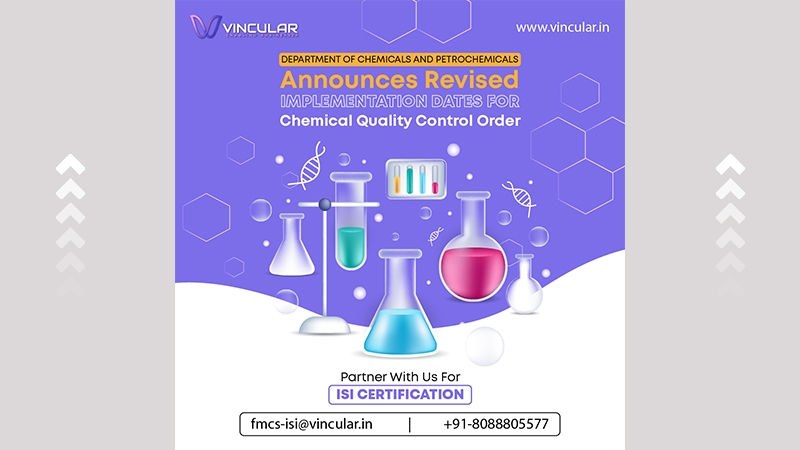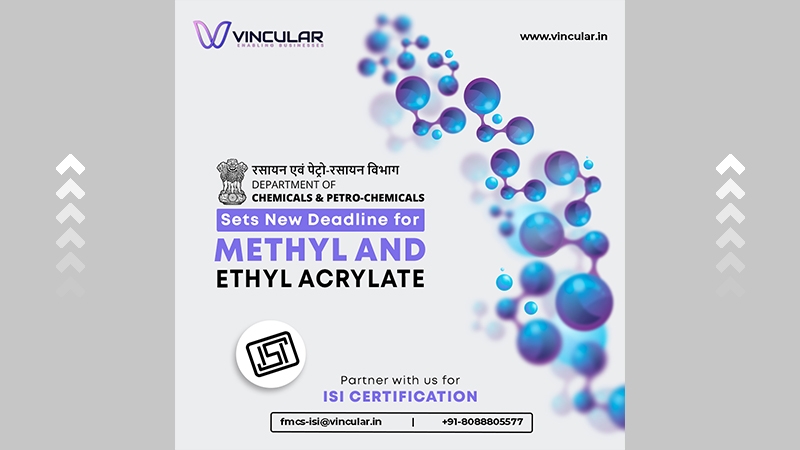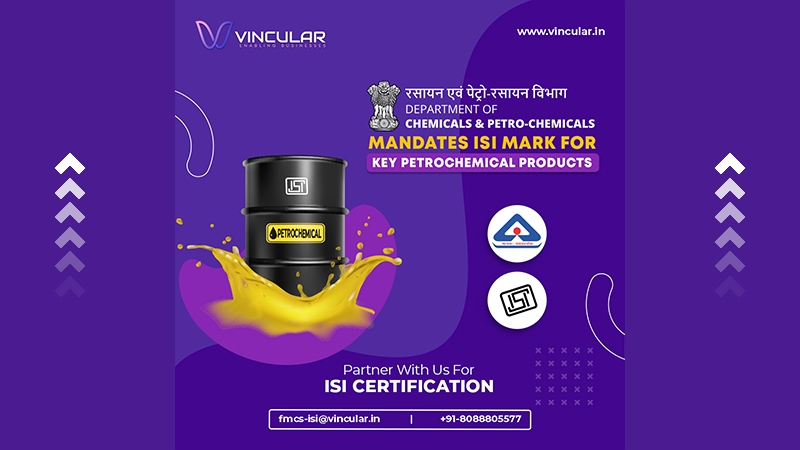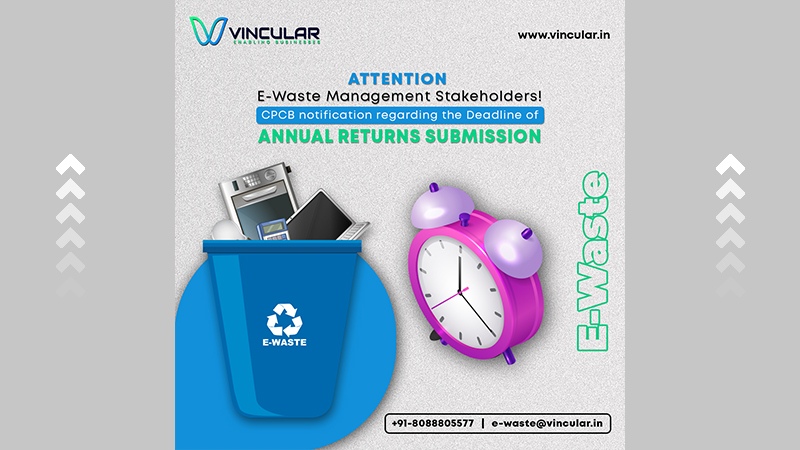
REGULATORY COMPLIANCE BULLETIN (Newsletter – February 2024)
BIS-ISI
DPIIT Announces Revised Implementation Dates for Chemical Quality Control Measures
On January 30, 2024, the Department for Promotion of Industry and Internal Trade (DPIIT) issued the Quality Control Amendment Order, 2024. Initially, implementation dates for certain chemicals were set in February. However, these dates have been revised, and the new implementation schedule is as follows:
- Morpholine: Effective from 1st August 2024.
- Acetic Acid: Effective from 3rd August 2024.
- Methanol: Effective from 3rd August 2024.
- Aniline: Effective from 3rd August 2024.
This rescheduling of implementation dates provides stakeholders with more time to prepare for compliance with the new quality control standards for these chemicals.
For further information refer to the official notification from here.
Department of Chemicals and Petrochemicals Sets New Deadline for Methyl and Ethyl Acrylate
Department of Chemicals and Petrochemicals has revised the implementation dates for the mandatory requirement for ISI Marks for Methyl Acrylate and Ethyl Acrylate in a Quality Control Amendment.
Initially, the order was set to be implemented on 29th February 2024. However, after careful consideration, the Department has revised the implementation date to 31st March 2025.
This revision in implementation dates is intended to provide stakeholders with ample time to prepare and ensure compliance with the new quality control standards for these crucial chemicals.
For further information refer to the official notification here.
Department of Chemicals and Petrochemicals Mandates ISI Mark for Key Petrochemical Products
In a groundbreaking move, the Department of Chemicals and Petrochemicals issued a Quality Control Order (QCO) on 26 Feb 2024 making ISI Mark mandatory for three distinct categories of petrochemical products which are as follows:
- Poly Vinyl Chloride (PVC) Homopolymers
- Polypropylene (PP) Materials for Moulding and Extrusion
- Diesel Engines – NOx Reduction Agent AUS 32
The order will come into effect on 24 August 2024, giving manufacturers one hundred and eighty-days window to comply.
This mandate underscores a commitment to enhancing product quality and ensuring consumer safety across the industry.
You can access the official notification here.
BEE
Revised Solar Photovoltaic Module (Solar panels) Labeling Fee Structure
In a notification dated 3rd November 2023, Solar PV modules were introduced in a voluntary regime of BEE under the S&L program, to mitigate carbon emissions and promote renewable energy in India.
In alignment with energy-efficient regulations for solar panels, BEE has updated the fee structure to encourage the production of highly efficient panels, as outlined below:
- Labelling fee Structure:
|
Star Label period/Validity of the star rating table for solar panel |
Labeling fee |
| 8th February 2024 to 31st December 2024 | 0.5 paisa per watt |
| 1st January 2025 to 31st December 2025 | 1 paisa per watt |
| From 1st January 2026 onwards | 2 paisa per watt |
The labelling fee is exempted for models with 4- and 5-star ratings during the period from 1st January 2024 to 31st December 2025.
The link for official notification can be accessed here
Waste Management
Important Update: CPCB notification regarding the Deadline for Annual Returns Submission
On January 29, 2024, the Central Pollution Control Board (CPCB) issued a notification stating that all producers must meet their Extended Producer Responsibility (EPR) target for the financial year 2023-24 by March 31, 2024.
Producers are also required to submit Quarterly & Annual reports on the E-Waste EPR Portal within the specified deadlines as per the rules.
Requests for reducing EPR obligations or extending timelines will not be entertained if unutilized EPR Certificates are available. Non-compliance may lead to necessary actions as per the rules.
This initiative aims to bring clarity, accountability, and transparency to e-waste management. It is not merely a compliance measure but a collective effort towards a sustainable future.
Access official notification through this provided link for this essential information here.
Green Credit Rules, 2023 – Tree Plantation Methodology
Green Credit is more than just a financial product, it’s a commitment to sustainability. It offers businesses the opportunity to access credit facilities while also incentivizing green initiatives.
Whether it’s investing in renewable energy, implementing energy-efficient technologies, or adopting eco-friendly practices, Green Credit encourages businesses to reduce their carbon footprint and contribute to a greener future.
The Central Government, under the Green Credit Rules 2023, has introduced a methodology for calculating green credit in tree plantation activities. Here’s a summary of the key points:
- Identification of Land: Forest Departments across states will identify degraded land parcels (like open forests, wastelands, and catchment areas) of at least five hectares for tree plantation to increase the green cover. Identified land must be free from encumbrances and be at least five hectares in size.
- Application Process: Individuals or entities wishing to plant trees for Green Credit can apply to the Administrator.
- Assignment and Proposal: The Administrator assigns suitable land and requests applicants to submit proposals for tree plantation.
- Demand Note: A demand note including tree plantation costs and administrative expenses will be issued to the applicant.
- Payment: Applicants must pay the specified amount to the Administrator within the given period.
- Plantation Execution: Once payment is made, the Forest Department will execute the plantation within two years as per the management plan.
- Completion Report: After planting, the Forest Department submits a completion report and issues a certificate to the applicant.
- Green Credit Issuance: The Administrator will evaluate the plantation activity and issue Green Credits based on the number of trees planted, at a rate of one credit per tree, with a minimum density requirement. Green Credit is calculated as one credit per tree, with a minimum density requirement of 1100 trees per hectare based on local conditions.
- Use of Green Credits: These credits can be used for compensatory afforestation compliance or reporting under environmental, social, and governance indicators, including corporate social responsibility.
These rules aim to enhance the green cover, this methodology not only supports environmental sustainability but also offers a path for corporate responsibility and compliance.
Let’s contribute to a greener, more sustainable future and continue to grow our green footprint.
PESO
Reduction in Compliance Burden: PESO Introduces Third-Party Inspection for Cylinder, Valve, and Regulator Testing!
In a recent notification, PESO issued that manufacturers of cylinders, valves, and regulators are required to adhere to the following guidelines regarding the inspection.
If the prototype testing was done by the Bureau of Indian Standards (BIS), your batch/lot testing should also be done by BIS.
However, if a manufacturer prefers a Third-Party Inspection Agency (TPIA) other than BIS for batch/lot testing, you need to get approval from BIS for your chosen TPIA.
After the batch/lot inspection by the approved TPIA, BIS will issue test certificates for the cleared lots.
If your prototype testing was conducted by a TPIA other than BIS, the same TPIA will handle your batch/lot testing, and they will issue the test certificates.
All manufacturers are required to comply strictly with these instructions without delay.
To access the official notification, refer to the link from here.
BIS-CRS
IS 16270: 2023 – Amendment of IS 16270: 2014
Recently on 27th Dec 2023 BIS revised the standard for Storage cells/Batteries (IS 16270: 2014) for Solar applications to IS 16270: 2023.
The scope of this standard has been changed from “This standard applies to secondary cells and batteries of lead-acid and nickel-based chemistry” to “This standard applies to all types of secondary cells and batteries used in solar photovoltaic applications”
The revised standard has been published to incorporate new chemistries now being used in solar applications.
The date of Withdrawal for the old standard IS 16270: 2014 is 27 March 2024.
Revision Highlights of IS 16270: 2023
- Maximum Charge current in 4.3.3.a
- Inclusion of Lithium battery type and other electro chemistries in Table 1, 2
- Inclusion of standards for Lithium cells and batteries in 7.2
- Introduction of long-duration capacity (C120) in 8.1
- Inclusion of capacity requirement of the rated capacity in 8.1.1
As of now BIS-CRS portal is not updated with the above new chemistry cell/batteries, we can expect the change at the BIS portal very soon. Then manufacturers can apply for storage battery BIS with Li chemistry too.
Official Gazette notification can be accessed from here.
CDSCO
CDSCO streamlined the PSUR Application Process by going to Digital
Starting March 11, 2024, the process for submitting Periodic Safety Update Reports (PSURs) regarding Marketing Authorization of New Drugs, Subsequent New Drugs (SND), Fixed Dose Combinations (FDC), Biologicals, and Veterinary products must be made online via the Sugam portal at www.cdscoonline.gov.in.
Offline submissions in hard copy or any other mode will no longer be available after this date.
This online system aims to streamline the regulatory submission procedure, making it easier and more convenient for all stakeholders.
Access the official notification from here.
CDSCO Enhanced Sampling Procedures for Drugs, Cosmetics & Medical Devices
To enhance efficiency and consistency in the sampling procedures of drugs, cosmetics, and medical devices, while ensuring the maintenance of a centralized monthly database of NSQ (Not of Standard Quality)/Spurious drugs, the CDSCO has drafted regulatory guidelines.
These guidelines have been formulated to be adopted by drug inspectors of both Central and State Drug Authorities.
The draft regulatory guidelines were circulated to all zonal/sub-zonal offices of CDSCO and State Licensing Authorities for their valuable input and suggestions.
Subsequently, inputs and suggestions were received and have been duly incorporated into the guidance document.
The final version of the guidance document, inclusive of all relevant inputs and suggestions, is now ready for implementation.
This notification serves as an official directive for all Central and State Drug Authorities to adopt and implement the finalized regulatory guidelines for sampling of drugs, cosmetics, and medical devices.
Access the official notification from here.
Voice Compliance
Growth of Telecom Sector in India
India’s telecom industry revenues are expected to increase by 63% in the decade by the end of the financial year 2025. This growth comes despite the industry consolidating from over 10 private mobile operators to just three main players: Jio, Airtel, and Vi.
In the past, the industry generated revenues of Rs 1.7 lakh crore in FY16, when there were more than 10 private companies. By FY25, revenues are expected to reach Rs 2.78 lakh crore.
This growth will be driven by factors such as tariff hikes, and users opting for higher-value data plans. Even without tariff hikes, revenues for the current financial year are projected to reach Rs 2.46 lakh crore, a significant increase from FY16 levels.
Looking ahead, revenue growth for the Indian telecom industry is expected to accelerate from 9% in FY24 to 13-15% year-on-year in FY25. This will be supported by factors like faster transitions from 2G to 4G, the introduction of 5G, and the addition of new subscribers.
Overall, the future looks promising for the telecom sector in India, with continued growth anticipated in the coming years.
TRAI imposes huge penalties on telcos to prevent privacy and cybercrime from increasing in the country
The escalation of fake calls has emerged as a significant concern for both consumers and regulatory authorities. Despite ongoing efforts to address this issue, the frequency of these misleading calls continues to rise, causing harm to millions of users nationwide.
The unending stream of fake calls not only disrupts the daily lives of consumers but also poses serious threats in terms of financial fraud and privacy violations.
With the rising complaints and urgent need for decisive action, TRAI has taken a decisive stand by imposing a hefty penalty of Rs 110 crore on major telecom companies for their inability to address the issue.
Furthermore, the disconnection of around 2.8 lakh mobile connections due to involvement in cybercrimes, as reported by Law Enforcement Agencies on the National Cyber Crime Portal, underscores the severity of the situation.
Stay tuned for further updates on regulatory actions and collaborative efforts aimed at tackling the rising tide of fake calls, ensuring a safer and more secure communication environment for consumers nationwide.
Stay Updated, Stay Compliant – Subscribe to our Newsletter Now!
Whether it’s important compliance notifications or changes in policies and regulations, we’ve got it covered.
Get your monthly dose of vital updates by subscribing to our LinkedIn Newsletter or WhatsApp Channel. You can also, watch our Publication Space to stay updated.






